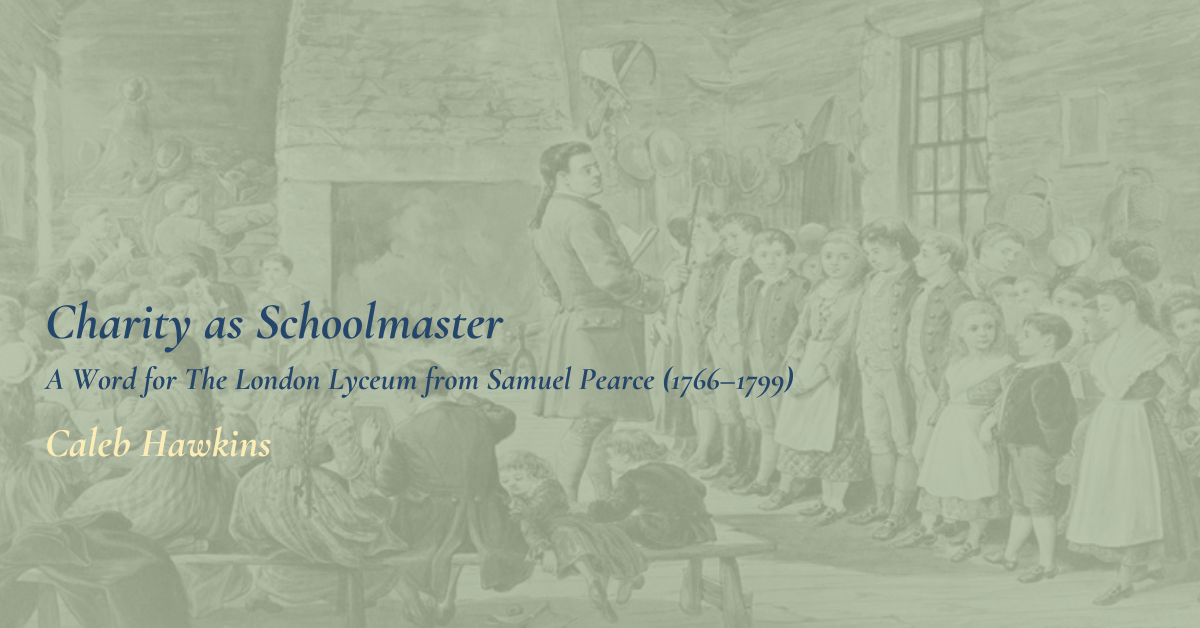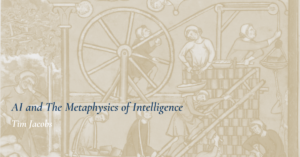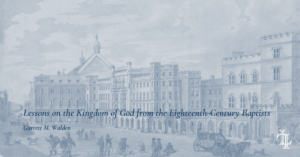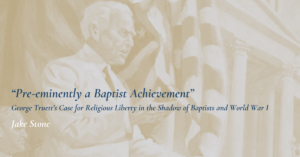As I ponder the vision of The London Lyceum, I believe there are old lighthouses within the Baptist heritage, waiting to be relit, that can encourage LL’s not-so-novel aspirations towards curiosity, critical thinking, cheerful confessionalism, and yes, charity. One such light worth considering is the English Particular Baptist divine of the eighteenth-century: Samuel Pearce. Pearce was the pastor of Cannon Street Baptist Church from 1789–1799, and he was a bright star who enflamed the heart of every friend he had before his tragic death at the age of thirty-three. His lifelong friendships included Andrew Fuller (1754–1815), John Ryland Jr. (1783–1825), William Carey (1761–1834), and William Ward (1769–1823). Fuller summed up Pearce’s legacy of extraordinary piousness with a striking description:
To develop the character of any person, it is necessary to determine what was his governing principle. If this can be clearly ascertained, we shall easily account for the tenor of his conduct. The governing principle in Mr. Pearce, beyond all doubt, was holy love. To mention this is sufficient to prove it to all who knew him. His friends have often compared him to that disciple whom Jesus loved. His religion was that of the heart. Almost everything he saw, or heard, or read, or studied, was converted to the feeding of this divine flame. Every subject that passed through his hands seemed to have been cast into this mould. Things that to a speculative mind would have furnished matter only for curiosity, to him afforded materials for devotion. His sermons were generally the effusions of his heart, and invariably aimed at the hearts of his hearers.1Andrew Fuller, The Life of Samuel Pearce (Ontario: H&E Publishing, 2020), 123.
In our day, such a pastor might be assumed to neglect serious thinking and avoid divisive doctrinal convictions. Pearce did no such thing. For example, in 1794, Pearce preached and printed a defense of believer’s baptism by immersion entitled The Scripture Doctrine of Christian Baptism. His exposition of biblical baptism was no cakewalk; it unfolded as a rigorous argument that included linguistic analysis of the relevant terms, exegesis of many crucial texts, logical argumentation, and a detailed historical survey of baptism in the church through the centuries. Two of his concluding statements illuminated his serious thinking and his unashamed convictions regarding the doctrine of believer’s baptism:
(1) If a divine command or apostolic example be essential to direct Christian worship, then infant baptism is no part of Christian duty, but a mere tradition.
(2) If infant baptism be anti-Scriptural, whatever respect we bear to individuals or societies who retain the practice, it becomes the real friends of Christ personally to bear witness against it by publicly dedicating themselves to him in his appointed way.2Samuel Pearce, Selected Works of Samuel Pearce, ed. Michael A.G. Haykin (Ontario: H&E Publishing, 2022), 102.
The pages of support for his position deserve their own treatment, but what stands out is Pearce’s charity in his note to readers of this work. Like a wise father, he wanted his little ones to imitate both his argumentation and the spirit in which he argued. To this end, Pearce provided a forewarning:
I shall not regret my compliance with your entreaties for its publication. But we have never more need of watchfulness over the frame of our spirits than when we are engaged in religious controversies, lest in the spirit of contest we lose the spirit of meekness and of love. Victory too often makes us vain, and impotence in argument inflames the zeal it should annihilate. Perhaps no controverted point has more frequently occasioned an undue exercise of the passions than the subject of the ensuing sermon. Suffer me therefore, my Christian Brethren, affectionately to caution you against an unbecoming triumph in the prevalence of the sentiments you espouse, or any uncharitable censures on those whose opinions and practice differ from your own.3Pearce, Selected Works, 69.
For Pearce, one’s manner of argumentation and the effects it produces were nonnegotiable ingredients for truly Christian argumentation. Notice the dual slopes of victory and un-persuasiveness: Victory cultivates vanity, and “impotence” (i.e. ineffectiveness) “inflames the zeal it should annihilate.”4Pearce, Selected Works, 69. Namely, when we come to a standstill with our theological sparring partners, instead of humbly submitting our differences, arrogant irritation bubbles over towards polemical badgering. Pearce was unswervingly convinced his Baptist conclusions were true and paedobaptism false, but he refused to let his espousal of his convictions be an “unbecoming triumph” and rebuked “uncharitable censures” of those with contrary beliefs.5Pearce, Selected Works, 69. Pearce was surrounded by a circle of friends who upheld such a spirit of humble charity. According to Michael Haykin, “evangelical catholicity that embraces all who are in Christ” was a “leading feature” of the common bond shared by Pearce, Fuller, and John Sutcliff (1752–1814).6Michael A.G. Haykin, One Heart and One Soul: John Sutcliff of Olney, His Friends and His Times (Darlington, England: Evangelical Press, 1994), 264. Of course, their catholicity was not without discernment.7For an analysis of the limits of John Ryland Jr. and Andrew Fuller’s catholicity, see Lon Graham, “‘A Union of Sentiments in Apostolical Doctrines’: The Catholicity of Andrew Fuller,” Journal of European Baptist Studies 21, no. 1 (2021): 105–22. Beyond Pearce and his closest companions, many contemporaneous Particular Baptists understood the distinction between a genuine “zeal for truth” and personal prejudice.8Raymond Brown, A History of the English Baptists. Vol. 2, The English Baptists of the Eighteenth Century (London: Baptist Historical Society, 1986), 140. In 1791, an association of likeminded Baptists in Yorkshire and Lancashire exhibited a similar posture when they wrote,
[That believers] differ in their sentiments respecting some of the speculative doctrines of theology, and some of the external modes of religious worship, is not at all to be wondered at; but that they should be so ready to censure and condemn one another on this account, is truly astonishing. There is such a difference in the capacities, education, circumstances and connections of men that it would be unreasonable to expect that their religious opinions should be exactly alike … When the apostle exhorts us to be ‘of the same mind and of the same judgment’ he does not so much intend a unity of opinion as a unity of affection.9The Dissenting Ministers of the Baptist Denominations in Association at Salendine Nook, June 15–16, 1791, 7–8; cited in Raymond Brown, A History of the English Baptists, 140.
The distinction between “unity of opinion” and “unity of affection” is at the heart of the matter. The necessity of Pearce’s remarks stemmed from his worry that the very doctrine he was debating, baptism, had more than any other doctrine “occasioned an undue exercise of the passions.”10Pearce, Selected Works, 69. There is great wisdom in recognizing that certain doctrinal controversies excite the worst instincts in us.
Pearce summoned biblical support from 1 Corinthians to demonstrate the inseparability of content and character. He argued that Paul’s exhortation to “Stand fast in the faith, to quit ourselves like men, and be strong” (1 Cor. 16:13) could not be isolated from the “numerous injunctions to forbearance and charity.”11Pearce, Selected Works, 70. Christlike strength is not brute strength; its force is fused with calculated kind-heartedness. By adding balance to the brawn of 1 Corinthians 16:13, Pearce was not downplaying the need for strength. In another text defending Calvinist soteriology, Pearce summed up a biblical vision for defending biblical doctrine with two qualities, meekness and prudence.12Pearce, Selected Works, 127. The real flex of Christian muscle is a certain shrewdness that chooses words carefully and dissects ideas with precision. He did not believe humility alone was sufficient to defend the truth faithfully. On the necessity of both meekness and prudence, he wrote, “If the former be wanting you will disgrace yourself; if the latter, the cause you espouse.”13Pearce, Selected Works, 127. He offered the prefatory notes of the Second London Baptist Confession as a model of meekness and prudence (Pearce, Selected Works, 127). The exhortation to readers of his defense of credobaptism emphasized a more common abandonment of Christian virtue, a lowly spirit. For Pearce, this was a part of effectively fighting under Christ’s banner: “We never afford any real service to our divine Master by contending for his cause if it is not in his spirit. Nothing will so effectually recommend the truth as the distinguished amiableness of those who profess it.”14Pearce, Selected Works, 70.
As for those who are on the other side of doctrinal dispute, Pearce called his readers to consider them charitably. He wisely cautioned his readers against being shocked by discord between those “whose piety, in other respects, you entertain the most respectful sentiments.”15Pearce, Selected Works, 70. Our theological disharmony should not immediately call into question the integrity of our opponents’ devotion to Christ. “To err is human,” says Pearce, and we must keep our “centre of union” in view amongst brothers and sisters we believe are in error:
But suffer not any difference of opinion on the positive institutions of our religion, to interrupt your fellowship with other Christians as long as it may be cultivated to mutual edification. Remember that you have all one centre of union — Christ Jesus, and you expect to meet with millions in heaven who are distinguished by different names on earth. Charity must teach you to think as highly of their sincerity as you expect justice should teach them to think of yours —we have a right to form a judgement on the actions of men, but it is God’s prerogative to search the heart. And so it ill becomes us to judge any man to be a hypocrite because he does not see with our eyes.16Pearce, Selected Works, 70–71.
Today, there are many temptations to break bonds of fellowship over (important) issues such as theological method, hermeneutics, covenant theology, ecclesiology, differing movements of retrieval, baptism, political theology, eschatology, and more. Pearce calls us to rebel against those impulses. We must think highly of our interlocutors, assume sincerity in their positions, and fight earnestly for genuine union with them without blurring our theological differences. For Pearce, charity was an essential schoolmaster for learning how to argue like a Christian.
So, what is The London Lyceum known for? I imagine many minds familiar with the ministry and its work will think of words such as Baptist, confessional, or analytical. However, it should also be known for its charity in theological dialogue. A recalling of LL’s core beliefs and commitments will illuminate this emphasis. Standing as the first of four values, charity is an anchor for the mission of this organization: The London Lyceum seeks to foster serious thinking for a serious church. And charity is a crucial ingredient for the potting soil where this mission bears fruit.
The London Lyceum’s threefold means for pursuing its mission are inspiring serious, virtuous, and confessional thinking. Distinct from the other two, virtuous thinking is accompanied by a justifying statement. It reads, “We Seek to Inspire Virtuous Thinking. Since Faith, Hope, And Love Are Fundamental to Proper Thinking.” Virtuous thinking in the spirit of 1 Corinthians 13:13 is implemented through four practices:
(1) Ingraining the meekness of wisdom exemplified in James 3:17 into our hearts and minds.
(2) Encouraging differing viewpoints in our podcast interviews, essays, and online society.
(3) Prioritizing friendship in our thinking since our goal is not to win arguments but to encourage virtuous thinking.
(4) Requiring love and respect for everyone and everything. Everyone, regardless of view, deserves both.
To refuse charity and disregard virtue as serious thinkers is to reject The London Lyceum’s identity and ignore one of its defining modes of theological engagement. Anyone who expresses pride for this organization must have a mind for these character traits.
The London Lyceum’s commitment to charity and virtuous thinking is an attempt to think in the spirit of Baptist forefathers like Pearce, devoting ourselves to excellent argumentation and integrity of character in both polemical engagements and constructive proposals. It is penetratingly clear that Pearce cared deeply for those he disagreed with. He was genuinely concerned about those with whom he argued and how he argued with them. Michael Gerson’s wisdom for political disagreement sums up one of my takeaways from Pearce’s posture toward his opponents: “Attempting to persuade someone — even when the source of disagreement is deep — involves the affirmation that they are worth persuading.” Of course, Pearce would be more specific. Our passion for persuasion should rise from our conviction that our opponents are worth convincing because they are God’s image bearers and in many situations are our family in the Lord.
I imagine many feel inspired by Pearce’s sentiments on charity, but this sort of virtue will not be cultivated if it remains just that, merely sentiments. As he concluded his prefatory note, Pearce revealed his distress over what his words might incite:
It would occasion real grief, were I to imagine that anything contained in the following pages was calculated to promote a different spirit from what I have now recommended to you. If I knew of such a paragraph I would expunge it, as a disgrace to myself and an injury to the cause I espouse. Happy in my extensive acquaintance with ministers, and other Christians of different persuasions, I would carefully avoid the use of any language which a candid opponent would condemn.17Pearce, Selected Works, 71.
In other words, Pearce sought to cut any content that compromised his character towards his opponents or encouraged a lack of charity in his allies. I imagine Pearce attempted this ethical editing as earnestly as possible. His anxiety should direct our conscience. If charity and virtuous thinking are our desire, then Pearce’s discerning comb must be taken up. As we write, argue, lecture, or preach this year, we must weed out uncharitable sentiments and fertilize charity into our content. Virtuous thinking is practical; it determines what words we put on the page. The London Lyceum’s mission will not stand the test of time without the buttress of charity, and this value will be nothing more than an empty statement on the internet unless those who associate with LL at every level establish it as a core identifier of who we are. Our hope is that many outside The London Lyceum or those skeptical of it could stumble upon our values or an article expounding them and already confirm this identity by their encounters with our people. Amid what feels like a digital dystopia that incentivizes ruthlessness, charity’s light must beacon us back to virtue’s shore. Samuel Pearce continues to be a lighthouse guiding us—and potentially many others—home.
[1] Andrew Fuller, The Life of Samuel Pearce (Ontario: H&E Publishing, 2020), 123.
[2] Samuel Pearce, Selected Works of Samuel Pearce, ed. Michael A.G. Haykin (Ontario: H&E Publishing, 2022), 102.
[3] Pearce, Selected Works, 69.
[4] Pearce, Selected Works, 69.
[5] Pearce, Selected Works, 69.
[6] Michael A.G. Haykin, One Heart and One Soul: John Sutcliff of Olney, His Friends and His Times (Darlington, England: Evangelical Press, 1994), 264.
[7] For an analysis of the limits of John Ryland Jr. and Andrew Fuller’s catholicity, see Lon Graham, “‘A Union of Sentiments in Apostolical Doctrines’: The Catholicity of Andrew Fuller,” Journal of European Baptist Studies 21, no. 1 (2021): 105–22.
[8] Raymond Brown, A History of the English Baptists. Vol. 2, The English Baptists of the Eighteenth Century (London: Baptist Historical Society, 1986), 140.
[9] The Dissenting Ministers of the Baptist Denominations in Association at Salendine Nook, June 15–16, 1791, 7–8; cited in Raymond Brown, A History of the English Baptists, 140.
[10] Pearce, Selected Works, 69.
[11] Pearce, Selected Works, 70.
[12] Pearce, Selected Works, 127.
[13] Pearce, Selected Works, 127. He offers the prefatory notes of the Second London Baptist Confession as a model of meekness and prudence (Pearce, Selected Works, 127).
[14] Pearce, Selected Works, 70.
[15] Pearce, Selected Works, 70.
[16] Pearce, Selected Works, 70–71.
[17] Pearce, Selected Works, 71.
Author
-

Caleb is a pastor at Generations Church in Norcross, Ga. He earned his MDiv at Reformed Theological Seminary and is currently pursuing a PhD in historical theology at The Southern Baptist Theological Seminary. He and his wife have two children, a boy and a girl. Caleb also serves as the managing editor for Hanover Press.
View all posts



